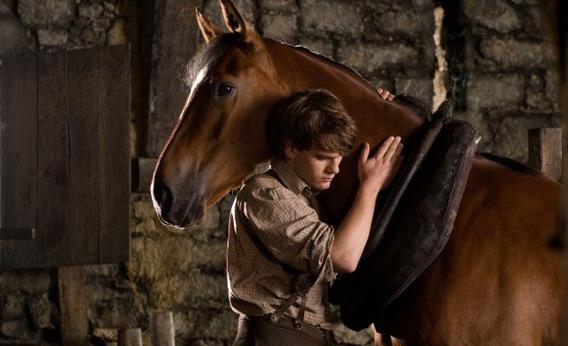Steven Spielberg’s War Horse (DreamWorks), a deliberate throwback to a long-dormant style of unabashedly sentimental Hollywood filmmaking, is so completely what you would expect it to be that it comes back around and transcends its own clichés. In this 146-minute WWI epic, there are plucky tenant farmers and sneering, oppressive landlords. There are idealistic youths whose character is tested by the crucible of war. There is, my right hand to God, a comic-relief goose. Above all, there are horses, those animals whose kinetic grace seems intimately bound up with the history of cinema, from Eadweard Muybridge’s racehorse photographs to John Ford’s equine-crisscrossed landscapes.
If you don’t thrill to the sight of a horse galloping across a green meadow with a beautiful young rider on its back—if you believe (wrongly) that National Velvet is just a sappy kids’ movie—then you may not be susceptible to the curious power of War Horse. Granted, this Spielbergian take on the horse epic doesn’t seem destined to become an enduring classic a la National Velvet. It lacks that film’s earthy humor and the specificity of its characterizations—not to mention that Jeremy Irvine, the perfectly adequate actor who plays the horse-mad teenage hero Albert Narracott, is no young Elizabeth Taylor. But like National Velvet, War Horse—based on a children’s novel and a play of the same name—is a love story about the bond between humans and animals that somehow sneaks past the viewer’s emotional defenses. One minute, you’re rolling your eyes at its corniness; the next, you’re discreetly dabbing at those same eyes with the back of your hand.
Writing about Spielberg’s other big holiday release, The Adventures of Tintin, I asked whether the director’s fascination with 3-D motion-capture gadgetry might be getting in the way of his usual knack for storytelling. With War Horse, Spielberg is back in his comfort zone. Unlike the manic Tintin, this film unfolds at a rustic, contemplative pace that complements the boy-meets-horse storyline.
The film begins with Joey, a rambunctious, untrained half-thoroughbred, passing into the care of Albert’s father Ted (Pete Mullan), a homesteading farmer in rural England in 1914. Ted is a good man but something of a failure—he’s been an alcoholic since returning from the Boer War, where he won a medal for participating in what’s suggested was an atrocity. When he comes home with an expensive racehorse rather than the plow-pulling draft horse he was supposed to buy, Ted’s practical wife Rosie (Emily Watson) insists that the animal be returned. But their son Albert (Irvine) begs to keep the horse and, with hard work, manages to tame and train it. In what’s surely the most suspenseful plowing sequence ever filmed, Albert teaches Joey to pull the plow just in time for the Narracotts’ farm to escape seizure by their landlord (David Thewlis), a miserly wretch whose son (Robert Emms) is Albert’s chief rival.
Then, to quote a line that’s used several times in the film, the war takes everything from everyone. As hostilities with the Kaiser break out, Joey is sold to a cavalry captain, played with old-school panache by Tom Hiddleston. (Albert’s goodbye to his pet may be the first occasion you’ll need that Kleenex.) Later, Joey will pass into the care of Emilie (Cecile Buckens)—a little French girl whose saccharine cuteness stands as the movie’s low point—and eventually into the cruel hands of the German army, whose treatment of animals alone would be justification for waging war on them.
Meanwhile Albert enlists as a soldier and is soon fighting alongside his former village rival in the trenches of Flanders Field. Spielberg invests considerable screen time in showing trench warfare in all its grisly absurdity: dozens of young men huddled in a warren of ditches, waiting to be sent out into a barbed-wire maze where they would almost certainly be shot to death. Like Stanley Kubrick’s great WWI film Paths of Glory, War Horse shows how, in the senseless butchery of real-life battle, terms like courage and cowardice lose their meaning. Though War Horse contains several spectacular battle scenes, there’s nothing remotely martial about its spirit. Just beneath the movie’s folksy sweetness lies a powerful and painful critique of war. The battle scenes show little explicit gore, but they’re plenty intense enough to make this PG-13-rated fare too frightening for young children.
I won’t further elaborate on the obstacles that keep horse and boy apart for the majority of War Horse. If you plan to see the movie, you don’t want to know, and if you couldn’t be dragged kicking and screaming into a Christmas-released Spielberg weepie, you don’t care. But if the subject matter leaves you cold, I’ll make one last argument for the film on aesthetic grounds. War Horse looks incredible; it was shot on film stock (a technology that, sadly, is fast becoming an antiquarian novelty) by Spielberg’s longtime cinematographer Janusz Kaminski, and the images have what I can only describe as a wonderful texture. They also have intense color: deep gemlike greens and reds, with black shadows out of an old master painting.
One shot near the end, a view of the road leading up to the Narracotts’ farm at sunset, is almost surreally extreme in its oversaturated beauty, like an old Technicolor movie remembered in a fever dream. (John Williams’ score, which ladles on the strings Max Steiner-style, only contributes to the impression of mid-20th-century cinematic grandeur.) This unabashedly sincere evocation of an old-Hollywood ending could be seen as a manipulative gesture on Spielberg’s part, or a loving one. How you see it may serve as a litmus test for your tolerance of War Horse, a movie that’s manipulative and loving at the same time.
